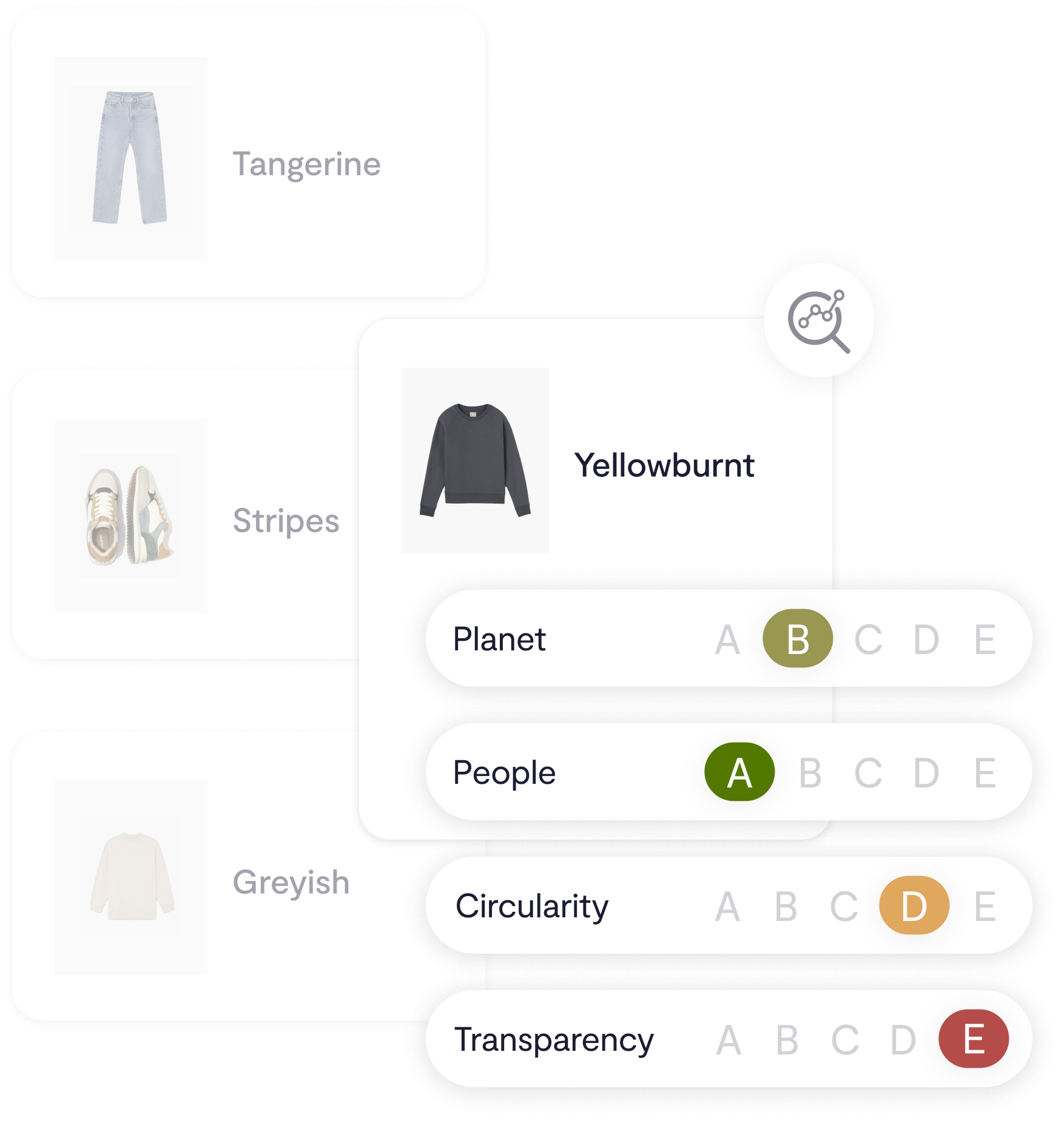Sustainability and legislation are two terms that we are going to see closely linked during 2023. The European Union remains firm in the application of the Green Deal and, for yet another year, the fashion industry will be in the spotlight when it comes to implementing all the initiatives introduced by the Circular Economy Action plan. The regulatory changes planned for this year make sustainability stop being a nice-to-have and become one of the greatest levers of transformation for the fashion industry. If your business is located in Europe or operates within the European Union, these are the main regulations that will shape your transition towards sustainability during 2023.
Europe places an increasing demand on textile companies to demonstrate that their activity is carried out in a sustainable and ethical way
It’s no coincidence that one of the 7 challenges included in our Sustainability Handbook for Resilient Fashion Business 2023 are the sustainability laws that will affect the textile sector this year. Whether they are regulations approved during the end of 2022 or new regulations and directives planned for the coming months, Europe places an increasing demand on textile companies to demonstrate that their activity is carried out in a sustainable and ethical way.
These are some of the legislative developments that the fashion industry should have in its sights in the coming months:
First set of standards of the Corporate Sustainability Reporting Directive
Despite having been presented at the end of 2022, the first set of standards of the Corporate Sustainability Reporting Directive will gain a lot of prominence in the coming months, since its entry into force is scheduled for January 1, 2024. Therefore, the textile companies subject to its application must prepare in record time to comply with the extensive volume of criteria to be published.
If you want to review in detail what information will have to be declared in the Corporate Sustainability Reports, we tell you about it in a specific article in which we review who this directive will affect, the different categories into which these standards are divided and how to address all CSRD criteria through a single sustainability platform.
Remember that one of the news introduced by the CSRD is that the information submitted must be certified by an auditor or an independent certifier. Having the support of an external entity such as BCome will be crucial to guarantee the credibility of the data and that there are no problems when reviewing the information provided.
Legislative proposal for substantiating green claims made by companies
We already announced it a few months ago, we could be facing the end of misleading claims in the fashion industry. The initiative that should have been approved in November 2022 becomes one of the great legislative promises of 2023.
This proposal will require textile companies to justify the claims they make about the environmental footprint of their products and services using standardized methods for their calculation. Its aim is to ensure that messages are honest across the EU, thereby reducing the risk of greenwashing and helping consumers make better choices by increasing the level of trust placed in item labels and communication.
While waiting to define what will be the rules that will regulate these statements, this could be their impact on fashion companies operating in European territory:
- Claims should be backed up with verifiable impact figures to ensure product claims are true and accurate.
- Companies should transparently show which methodologies, indicators, criteria or standards they have used in their assessments.
- The impacts should be calculated taking into account the entire product, not just a part.
- It’d be necessary to work with an external partner, such as BCome, who validates the information published by the company to guarantee the authenticity of this data.
Everything indicates that the new directive seeks to end the communication of information that is not supported by a Life Cycle Assessment. To ensure honest results, the methodology that we follow at BCome when carrying out LCA follows the ISO 14040/14044 Environmental Management standards and the recommendations of the EU Product Environmental Footprint (PEF). However, our approach goes beyond conducting environmental impact assessments. We offer our brands the possibility of evaluating the performance of their collections in four areas of impact: planet, people, transparency and circularity.
Review of the requirements on packaging and packaging waste in the EU
One of the last updates published by the European Union during the past year was the revision of the Directive on packaging and packaging waste. These changes seek to ensure that all packaging on the EU market is reusable or recyclable in an economically viable way by 2030. As well as, that all plastic packaging placed on the market can be reused or recycled profitably.
Taking into account the volume of plastic packaging used by the fashion industry, it’s worth bearing in mind what are some of the innovations introduced to achieve the transformation of the packaging used:
- The minimization of empty space in the packaging in specific sectors, including e-commerce, stands out.
- Excessive packaging is restricted, as well as certain forms of unnecessary packaging, in order to support reuse and recharge systems.
- The application of design criteria for recycling is required, which is complemented by the evaluation of the recyclability of the packaging.
- Without specifying the specific percentage, the need to include a minimum recycled content in plastic packaging is also defined.
Some brands have begun to implement this initiative by developing new packaging formulas that allow the complete reuse of packaging. This is the case of Ganni and their new reusable envelope for online purchases. Once the order is received, the consumer only has to fold the packaging and take it to a post office. The brand will receive it and can use it again in a new shipment.
New policy framework on bio-based, biodegradable and compostable plastics
Most plastics are made from fossil fuels and, if not properly managed at the end of their useful life, the waste contributes to increasing greenhouse gas emissions. In order to avoid this, the European Commission adopted at the end of 2022 a policy framework on the sourcing, labeling and use of bio-based plastics and the use of biodegradable and compostable plastics.
This initiative is not legally binding. However, it provides great clarifications on the most sustainable alternatives to non-biodegradable plastics of fossil origin and establishes the conditions to ensure that the overall environmental impact of their production and consumption is positive.
Measures to reduce the impact of microplastic pollution on the environment
Another of the news that is pending approval during this 2023 and that will have legal binding are the measures to reduce the impact of microplastic pollution in the environment. This initiative will focus on labeling, standardization, certification and regulatory measures for the main sources of microplastics.
These are some of the standards considered for synthetic textiles that this legislation could include:
- Ecodesign requirements, including the use of new materials, such as biodegradable yarns.
- Improve manufacturing processes, including pre-washing of clothes, before they are put on the market.
- Establish rules to hold producers accountable for intervening before products become waste, such as effective take-back schemes.
- Inclusion of recycled content in textiles.
- Apply filters or other technical solutions in washing machines and dryers.
- Apply technologies to avoid mixing microplastics with sludge in wastewater treatment plants.
- Establish minimum information requirements and label products according to their level of microplastic emission.
In addition to the general regulations established for the European territory, during 2023 we will be able to see how certain state regulations that affect textile companies operating in some of the main countries of the European Union come into force:
Supply Chain Due Diligence Act – Germany
In order to ensure fairness in global supply chains, the Law on Corporate Due Diligence in Supply Chains comes into force in Germany this year for companies with more than 3,000 employees. Its goal is to hold companies accountable to help protect human rights in their supply chains.
These are the requirements that will be required of companies for their own business operations and the business operations of direct suppliers:
- Draft and adopt a political declaration on respect for human rights.
- Conduct a risk assessment: implement procedures to identify adverse human rights impacts.
- Participate in risk management to avoid possible negative impacts on human rights.
- Establish a complaints system.
- Implement transparent public reporting.
Climate Impact labels – France
Starting this year, all garments sold in France will require a climate impact label, in accordance with the decree on consumer information on the environmental qualities and characteristics of waste-generating products. Specifically, the information that must appear on the labels of textile products is as follows:
- The traceability of the product supply chain.
- The amount of recycled material in the item.
- The presence of microplastics.
- The level of recyclability of the product.
The BCome platform has all the necessary tools to easily obtain all the data required by the new decree of the French government.
The Extended Producer Responsibility for textiles – Netherlands
From July 2023, textile manufacturers and importers will be co-responsible for the management of waste from products sold.
This year Extended Producer Responsibility (EPR) for textiles will be introduced in the Netherlands. This means that clothing manufacturers will be responsible for the collection, recycling, reuse and waste phase of the products they put on the market. Manufacturers will also have to bear the logistics costs of the system.
This measure seeks to promote the reduction of textile waste through the implementation of circular initiatives in the fashion industry.
Mandatory textile waste sorting – Finland
If during 2022 a new law on the labeling of clothing and footwear came into force in order to improve consumer protection, this year, the amendment to the Finnish waste law requires that textile waste begin to be collected separately.
This is an initiative that comes two years before the deadline set by the EU to apply the new regulations on textile recycling.
These are some of the regulations that will shape the fashion industry in Europe in the coming months. A set of standards that seek the sustainable transformation of a sector whose participation and responsibility are essential to achieve the environmental and social objectives set by the European Commission.
Legislation will be the definitive engine for the fashion industry to move towards sustainability and at BCome we can help you meet the requirements established by law so that your company complies with the new regulations. Our mission is to simplify the complexity behind sustainability, shall we talk?









